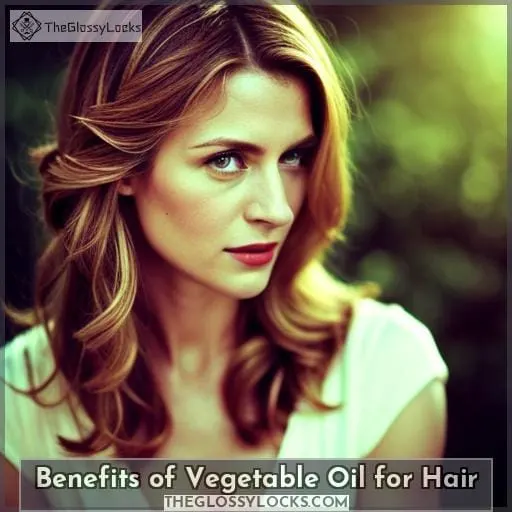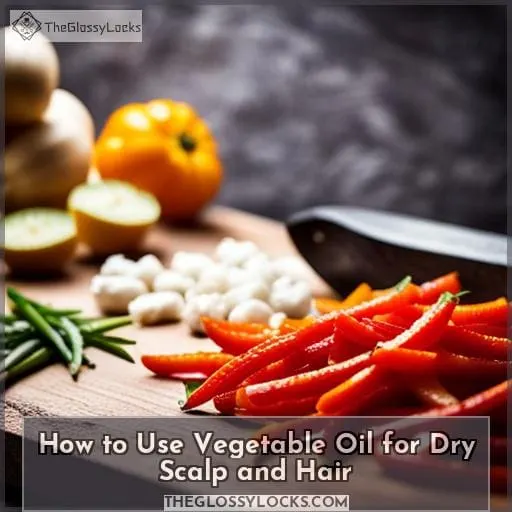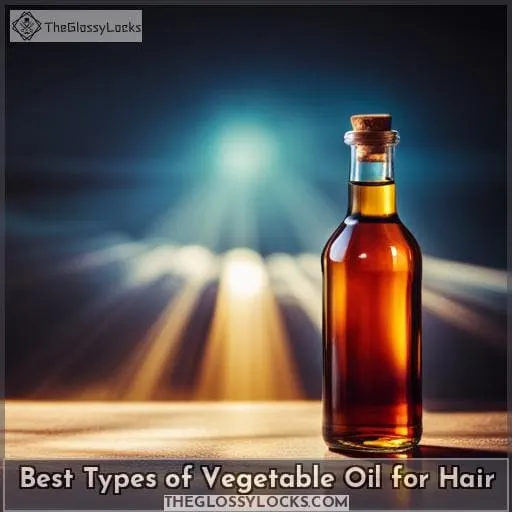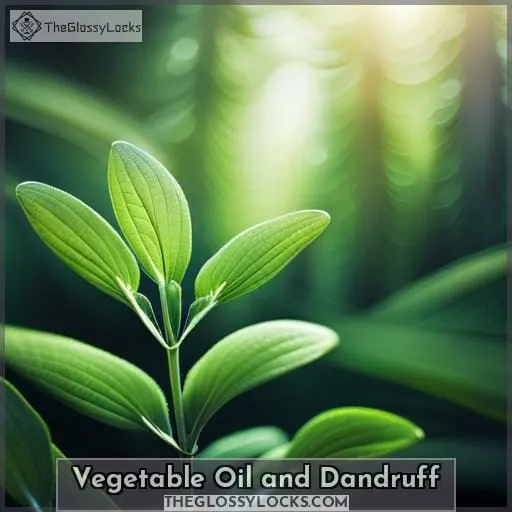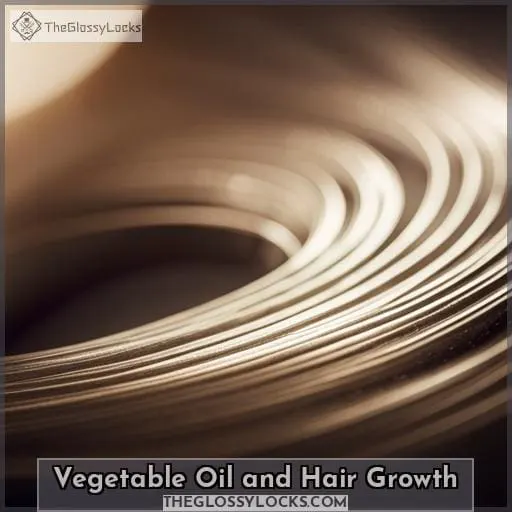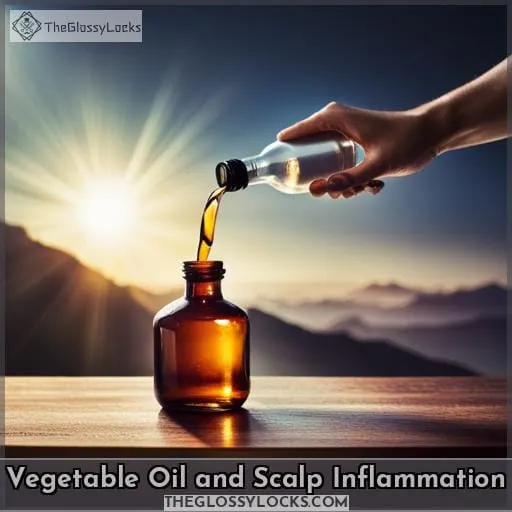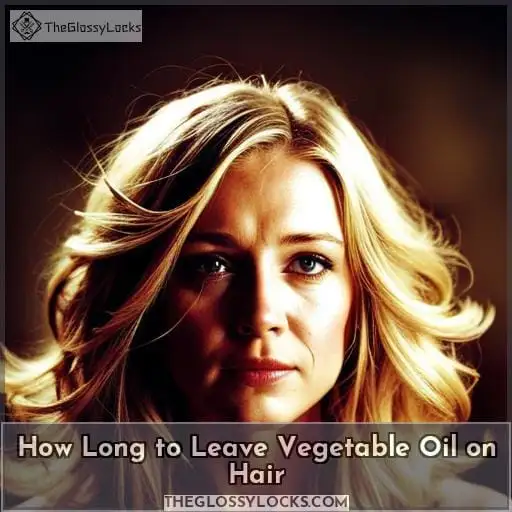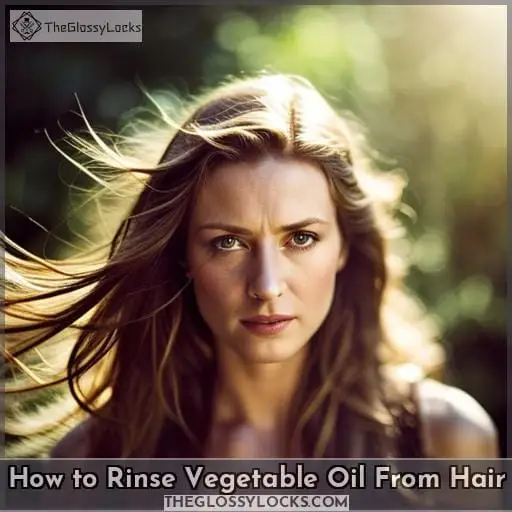This site is supported by our readers. We may earn a commission, at no cost to you, if you purchase through links.
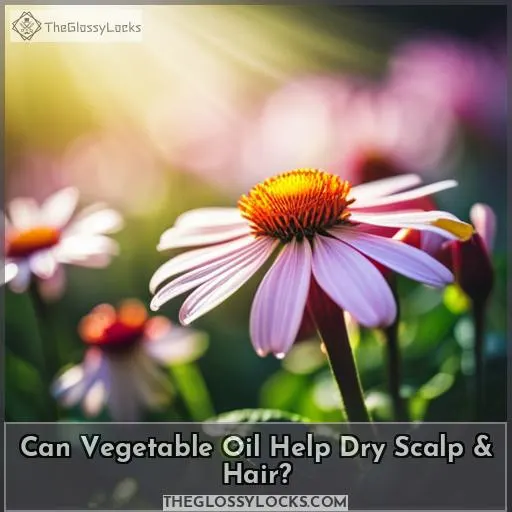 Don’t you just hate it when your scalp feels dry and your hair looks lifeless? If that’s something you’re dealing with, then vegetable oil may be the answer to all of your problems. It can help restore moisture in both the scalp and hair while protecting them from environmental damage.
Don’t you just hate it when your scalp feels dry and your hair looks lifeless? If that’s something you’re dealing with, then vegetable oil may be the answer to all of your problems. It can help restore moisture in both the scalp and hair while protecting them from environmental damage.
In this article, we’ll explain how vegetable oil can help revive dry scalps and dull strands as well as which types are best suited for different kinds of hair.
Ready to learn more about why so many people swear by using veggie oils on their locks? Let’s dive right in!
Table Of Contents
- Key Takeaways
- Benefits of Vegetable Oil for Hair
- How to Use Vegetable Oil for Dry Scalp and Hair
- Best Types of Vegetable Oil for Hair
- Vegetable Oil and Dandruff
- Vegetable Oil and Hair Growth
- Vegetable Oil and Scalp Inflammation
- Vegetable Oil as Heat Protectant
- How Long to Leave Vegetable Oil on Hair
- How to Rinse Vegetable Oil From Hair
- Considerations and Potential Disadvantages of Using Vegetable Oil for Hair
- Conclusion
Key Takeaways
- Vegetable oils help retain moisture in the hair and prevent dryness and brittleness.
- They strengthen the hair, reducing the risk of breakage and split ends.
- Vegetable oils combat dryness, leaving the hair softer and more manageable.
- Coconut oil, olive oil, almond oil, and other vegetable oils offer hydration, scalp health, growth stimulation, and protection from environmental factors.
Benefits of Vegetable Oil for Hair
The use of vegetable oils for hair can offer many benefits, such as retaining moisture and preventing breakage. Additionally, it helps to minimize dryness and protect against environmental damage. With the right type of oil chosen based on your hair type, you can expect nourished locks with improved strength and resilience.
Retains Moisture and Prevents Breakage
Applying vegetable oil to your hair can help lock in moisture and reduce breakage, creating softer, shinier locks. Coconut or olive oil is great for a dry scalp as they contain fatty acids that nourish and moisturize the skin.
Scalp massages with warm vegetable oils help relieve dandruff while also protecting the hair from UV rays, pollutants, and other environmental damage.
To treat damaged or dry hair strands, mix a tablespoon of any vegetable oil with mashed avocado, egg yolk, and honey for an intensive conditioning mask.
Minimizes Dryness
Drenching your locks in vegetable oil can help quench the thirst of dryness. It’s packed with essential fatty acids that are great for scalp and hair hydration. Plus, it reduces inflammation, a common problem with dry scalps or hair. Vegetable oils can penetrate deep into the follicles, moisturizing from within.
They are one of the best natural remedies for dry scalp or hair. With consistent use, they restore moisture levels and minimize breakage by protecting against environmental damage like UV rays and pollution exposure.
So go ahead—hydrate those tresses!
Protects Against Environmental Damage
Regularly using vegetable oil provides a protective shield against environmental damage to your hair. It helps protect it from UV rays, pollution, and other elements that can cause dryness and breakage.
Vegetable oils are rich in essential fatty acids, which help nourish the scalp while providing relief for a dry scalp.
Natural remedies such as avocado, coconut, or olive oil provide an effective way to keep hair healthy without harsh chemicals or ingredients.
- Use unprocessed cold-pressed virgin oils.
- Apply onto clean and dry hair.
- Massage into the scalp once or twice per week.
- Rinse with warm water after application.
- Avoid combing through when wet as this may lead to breakage of fragile strands of hair.
- Look out for products containing natural plant extracts like aloe vera and jojoba, which will further improve the health of your locks!
With regular care, you can maintain beautiful, healthy tresses free from environmental harm all year round!
How to Use Vegetable Oil for Dry Scalp and Hair
Treating your dry scalp and hair with vegetable oil is a great natural solution. Scalp massages with warm oil are known to treat flaky scalps, while making a mask of the oils combined with other ingredients can give you shinier, healthier-looking hair.
Scalp Massage With Warm Vegetable Oil
Gently massage your scalp with warm vegetable oil for a heavenly experience that’ll leave your hair feeling luxurious and silky soft.
Vegetable oils are an excellent source of hydration, bringing relief from dry scalps and nourishing the follicles with essential vitamins and fatty acids.
This hot oil treatment helps retain moisture in both the scalp and hair strands, promoting healthy growth over time.
The moisturizing properties of vegetable oils can also prevent breakage caused by environmental damage, such as excessive heat or sun exposure.
With regular use, this simple ritual provides long-lasting benefits that keep your locks looking vibrant and beautiful!
Hair Mask With Vegetable Oil and Other Ingredients
For a hydrating treatment, mix vegetable oil with natural ingredients like mashed avocado, egg yolk, and honey for an intensive hair mask.
Here are some tips to keep in mind when creating your own homemade masks:
- Start by washing your hair thoroughly with clarifying shampoo before applying the mask.
- Use unprocessed cold-pressed virgin vegetable oils for best results. Coconut oil is particularly beneficial if you have dry or slow-growing locks!
- Leave the mixture on for 30 minutes before rinsing it off with warm water to ensure that all of its nutrients are absorbed into your scalp and strands properly.
With these steps, you’ll be able to enjoy softer and healthier-looking tresses while helping prevent environmental damage too!
Best Types of Vegetable Oil for Hair
Are you looking for the best types of vegetable oil to use on your hair? From coconut, almond, olive, and avocado oils to grapeseed, argan, and jojoba oils as well as sunflower oil; these natural oils can each bring their own unique benefits to help nourish dry scalp and hair.
Coconut Oil
Try massaging your scalp with coconut oil to give it some extra hydration and shine. Coconut oil is rich in essential fatty acids, vitamins, and minerals, making it a great natural remedy for dry scalps.
It helps reduce dandruff and nourishes the hair follicles. Additionally, coconut oil protects against environmental damage such as pollution and sunlight. Its antifungal properties also make it effective against common scalp infections that cause itching or flaking of the skin.
For best results, massage a few drops of warm coconut oil into your scalp twice a week.
Almond Oil
Almond oil’s essential fatty acids can deeply nourish and soothe your scalp, giving it the hydration it needs to look its best. This vegetable oil improves skin health with its anti-inflammatory properties, while also helping to reduce dryness and dandruff.
It is rich in vitamins A and E, which aid hair growth by strengthening follicles from within.
Almond oil recipes using other natural ingredients like eggs or honey can help promote healthy locks without damaging them further due to chemical treatments.
Olive Oil
Olive oil can be beneficial for your hair as it can promote growth and help protect against breakage. Use pure, unprocessed olive oil to make DIY masks or conditioners for dry scalp and damaged hair. Massaging warm olive oil into the scalp helps with hydration, while cooking with oils keeps hair healthy from the inside out.
Plus, using olive oil in a mask is great for moisturizing! It’s best used twice a week to avoid greasiness but also reap its benefits like preventing dandruff and split ends.
Avocado Oil
Avocado oil is the perfect choice to nourish and moisturize your hair, restoring its shine and strength. It is loaded with vitamins, antioxidants, monounsaturated fats, and other nutrients. This oil can reduce dandruff, prevent breakage, and protect against environmental damage like pollution or sunlight.
A scalp massage using warm avocado oil works wonders on dry, flaky scalps. Additionally, a homemade mask of mashed avocado, egg yolk, and honey provides great results for shinier, healthier hair.
Natural trends are encouraging people to switch over to green beauty products. Currently, 53% of women over 18 use all-natural products that include nutrient-rich oils like coconut, argan, jojoba, almond, olive, grapeseed, lavender, and lemongrass.
Each of these oils offers its own unique benefits when used properly for healthy locks.
Grapeseed Oil
Grapeseed oil is a great choice for dry, brittle, and dandruff-prone hair. It conditions the hair to protect against breakage while keeping your scalp hydrated. Grapeseed oil provides essential fatty acids that can reduce inflammation of the scalp and UV damage to keep your locks looking healthy.
This vegetable oil also acts as a heat protectant when styling with flat irons or curling wands – minimizing damage caused by high temperatures! Additionally, it works well in cooking applications due to its light flavor profile compared to other oils like olive or coconut.
To reap grapeseed’s benefits even more deeply, try creating an at-home mask by combining it with honey and mashed avocado – you’ll be left feeling silky smooth!
Argan Oil
Try argan oil to protect hair from heat damage and environmental factors, while also promoting growth and thickness. This natural oil is rich in vitamin E, antioxidants, fatty acids, and other essential nutrients.
It is ideal for treating dry scalp or preventing split ends. Applying it directly to the scalp can help reduce frizziness and nourish the roots of your hair with essential proteins.
Argan oil can be used alone or mixed into a homemade mask with honey and eggs for an even more intensive treatment! Regular use will keep your hair looking healthy without adding any chemicals that could have long-term effects on its health.
Use warm argan oil for massaging purposes before washing out so you can reap all its benefits without risking over-oiling your locks!
Jojoba Oil
Jojoba oil is a great choice for dry, brittle, and greasy-prone hair. It helps moisturize the scalp while also providing conditioning benefits.
Jojoba oil can be used as an intensive conditioner to reduce breakage and promote healthier-looking hair. Additionally, it contains various nutrients that act as natural boosters for healthy hair growth.
Vitamins, antioxidants, and monounsaturated fats are all beneficial in promoting stronger tresses.
When applied regularly to the scalp or strands of your locks, you’ll notice improved hydration levels along with increased strength over time.
Sunflower Oil
Sunflower oil is like a superhero for your dry, brittle hair. It is packed with essential fatty acids that protect from environmental damage and keep strands hydrated.
Sunflower oil benefits include reducing dandruff and preventing breakage. Massaging the scalp with warm sunflower oil can treat dryness.
A mask of sunflower oil, egg yolk, and honey will make hair shinier. When using vegetable oils for better hair health, be sure to opt for unprocessed cold-pressed virgin varieties instead of cooking oils.
Sunflower oil can also help minimize water absorption in damaged hair, so you’ll have healthy-looking tresses all day long!
Vegetable Oil and Dandruff
Using a variety of natural, cold-pressed vegetable oils can help reduce the symptoms associated with dandruff and scalp dryness. A regular scalp massage with coconut oil, olive oil, or sunflower oil can provide long-term relief from itchy scalps due to their moisturizing properties.
They also help protect hair from environmental damage like pollution and UV radiation. Additionally, they provide essential fatty acids that prevent inflammation on the scalp.
For best results, use unprocessed oils such as extra virgin olive or avocado for deep hydration of damaged hair follicles.
For those suffering from dandruff-related issues, adding almond, jojoba, or grapeseed oils to their daily routine may be beneficial. These oils have antifungal and anti-inflammatory properties that help soothe irritated skin and combat yeast build-up on the surface layer of the scalp.
Consistent use of these oils can significantly reduce irritation levels over time.
Finally, combining these natural remedies into an effective yet gentle hair care routine is highly recommended for anyone looking for reliable solutions against common issues caused by dryness and other damaging factors such as heat styling product usage.
Vegetable Oil and Hair Growth
Using the right vegetable oil on your scalp and hair can help promote healthy growth. Scalp massages with warm oils like coconut, almond, olive, or grapeseed can improve blood circulation to the follicles, which encourages hair growth.
Oils also add essential nutrients that protect against environmental damage and control dandruff.
The type of oil you choose should depend on your individual hair type. For example, those prone to greasiness may want to opt for lighter oils such as sunflower or jojoba instead of heavier ones like avocado or coconut oil.
A mask made from mashed avocado combined with egg yolk and honey is a great way to get deep hydration into both the scalp and strands while keeping it lightweight enough not to cause build-up when used regularly over time.
Finally, rinse out any excess residue using warm water followed by clarifying shampoo for best results!
Vegetable Oil and Scalp Inflammation
Applying cold-pressed vegetable oils to the scalp can help reduce inflammation, protect against UV damage, and promote hydration. Natural remedies such as olive oil or coconut oil have fatty acids that restore moisture levels in the scalp and hair follicles.
Scalp massages with warm vegetable oil can also be beneficial for reducing dryness of both skin and hair strands. Disadvantages include potential allergic reactions from latex allergens found in some varieties of unprocessed plant material used to make natural oils.
However, when these risks are managed properly through patch tests prior to use, there are many benefits which outweigh any cons associated with using organic products on your skin or hair health.
Vegetable oils provide a safe way for naturally relieving inflammation while hydrating the scalp without harsh chemicals commonly found in commercial products today – making them an excellent choice for those looking for alternative solutions beyond traditional drugstore treatments available today!
Vegetable Oil as Heat Protectant
Vegetable oil is an effective way to protect your hair from heat damage. Not only does it provide hydration for the dry scalp and strands, but its natural antioxidants help prevent environmental factors like sun exposure from damaging the structure of your hair.
Cooking with vegetable oil can also benefit you. The fatty acids in these oils are beneficial for scalp massage and the overall health of your hair. If you’re looking for a natural alternative, try coconut or olive oil. They have proven to be especially good at protecting against heat damage while providing valuable nutrients that promote healthy growth.
For best results when using vegetable oils on your strands, make sure to apply them liberally but evenly onto damp (not wet!) locks before blow-drying or styling with hot tools.
With consistent use over months, you may even experience thicker-looking tresses due to improved hydration levels throughout each strand!
How Long to Leave Vegetable Oil on Hair
To get the most out of your vegetable oil treatment, leave it on for at least 15 minutes before rinsing off with warm water and a clarifying shampoo.
- Leave duration: The longer you leave vegetable oil in your hair, the more moisture it will retain.
- Oil application: Make sure you’re applying enough oil so that all strands are coated evenly, but not too much as this may make hair greasy and heavy.
- Overnight treatment: If leaving on overnight, apply an extra layer of protective material such as a shower cap over your head after coating each strand in the oil to prevent any leakage onto bedding or clothing.
- Hair care: After washing out vegetable oils from hair, use conditioner if needed and rinse thoroughly with cool water to close cuticles, which help retain moisture better than hot water would.
For dry scalp sufferers looking for relief from itching while promoting healthy growth, using unprocessed cold-pressed virgin oils is recommended due to their high concentration of essential fatty acids, which can help reduce inflammation caused by dryness.
How to Rinse Vegetable Oil From Hair
Gently wash away the oil with a clarifying shampoo to reveal your softer, hydrated tresses.
- Use warm water to wet your hair and then apply a generous amount of shampoo. Massage it into the scalp for two minutes before rinsing off with lukewarm water.
- If there is still some residual oil, repeat this process until all traces are gone.
- Finish by using cold water, which will help seal in moisture and make sure no residue remains on the strands themselves.
Rinsing out vegetable oils is essential for healthy-looking locks, but don’t forget it’s just one part of an overall good haircare routine. Other important steps include regular trimming, avoiding heat tools when possible, mask treatments once every week or so (depending on individual needs), and eating nutritious foods like fruits and vegetables, which contain vitamins A and E – both beneficial for strong growth! With consistent care over months, you’ll be able to enjoy beautiful results from moisturized dry scalps without having to worry about any stubborn residues left behind after application or washing time comes around again soon afterwards.
Considerations and Potential Disadvantages of Using Vegetable Oil for Hair
Considering the potential use of vegetable oil for hair growth, it is important to consider any potential issues that may come with its usage. Scalp irritation, greasiness, and long-term effectiveness are all factors to be aware of before making a decision about using vegetable oil in your hair care routine.
Potential scalp irritation?
Although using vegetable oil for hair can be beneficial, it’s important to consider the potential risk of scalp irritation. Have you noticed any signs of sensitivity after applying vegetable oil? Allergic reactions and oily residue may occur if it’s not applied correctly.
Hair texture or application techniques could also affect how well the product works on your scalp. To reduce the chance of irritation, use a small amount initially and gently massage it into your dry hair with light pressure from your fingertips only.
If your skin becomes irritated, stop using it immediately and consult a doctor if necessary before continuing to apply oils onto your scalp or hair strands again in the future.
Can cause greasiness?
Be careful not to overuse vegetable oil on your hair, as it can lead to greasiness. Natural remedies have their place in a healthy scalp and hair care routine, but too much of any product can cause problems like oily roots or clogged pores.
If you’re using vegetable oil for dry scalp or general health benefits, be sure to stick with the recommended amount and wash out thoroughly after use.
Pay attention to how often you apply it. If you find the need arises more than twice a week, then consider switching up your products instead of increasing quantity usage.
Long-term effectiveness?
Though it may be tempting to use vegetable oil for an immediate fix, its long-term effectiveness on dry scalp and hair is debatable. Frequent usage of organic oils may help hydrate the scalp and maintain hair health, but only if used in moderation.
Natural remedies such as avocado oil or sunflower seed oil have proven their worth when it comes to nourishing dry scalps, but they are not a permanent solution either. Vegetable oils can provide short-term benefits, but frequent application will be necessary for continued results like increased growth, thickness, softness, strength, etc.
Therefore, one has to weigh the pros and cons before opting for vegetable oil as your go-to remedy; using too much could result in greasiness that might actually make things worse!
Conclusion
With the rate of women over 18 using all-natural hair care products increasing by 53%, it’s no wonder that vegetable oils are becoming more popular. Vegetable oils, such as coconut, almond, olive, avocado, grapeseed, argan, jojoba, and sunflower oil, provide various benefits to help nourish and protect dry scalp and hair.
From retaining moisture and preventing breakage to promoting hair growth and reducing inflammation, vegetable oils are an excellent choice for anyone looking to nourish and protect their dry scalp and hair.

